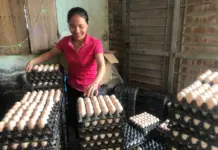 |
| Each weaver ant egg is as small as a rice grain and has a milky colour. |
Although it can generate income for locals, harvesting weaver ant eggs is not so easy, as the work requires both luck and hard work.
Hoang Thi Hop and Ma Thi Hoa, two women from An Lac commune, Son Dong district, are experienced in finding ant nests and harvesting eggs as they have done this since they were little girls.
Hop and Hoa are working in a cooking team of the Khe Ro collective for community-based tourism service, which offers visitors indigenous and unique dishes of ethnic groups in Bac Giang province.
When searching for the eggs, their belongings are simple, including a knife, a bamboo basket and protective equipment such as gloves, boots, masks, and hats to prevent attack from ants, snakes and insects.
According to Hop, weaver ant eggs can be collected from the middle of the third lunar month to the fifth lunar month when the eggs are quite plump. After this period of time, the eggs will hatch into larvae.
Each trip, one can earn several hundreds of thousands of Vietnamese dong from collecting ant eggs. Hop revealed that when things are going well, she can collect from three to five kilogrammes of the eggs per trip, which can be sold for around VND300,000 per kilogramme.
Although it can generate income for locals, harvesting weaver ant eggs depends on both luck and hard work. If luck is good, it is not difficult to earn millions of Vietnamese dong, but oftern locals return home empty-handed after the trip. In addition, hunters have to face the risks of being attacked from wild and aggressive ants, mosquitoes, and snakes or falling down from high trees.
 |
|
Each weaver ant nest produces between 0.1 and 0.2 kg of eggs. |
Ma Thi Hoa said that it is easier to collect weaver ant’s eggs on sunny days, as after sifting through the nests from the trees and exposing them to the sun, the ants will quickly evacuate, leaving their eggs. Meanwhile, on rainy days, the ants will consistently lie in the nest, making it difficult to collect the eggs.
However, not all kinds of ant eggs are edible. It must be eggs of weaver ants and red ants, of which the eggs taste rich and creamy.
Once finding an ant nest, a hunter climbs on the tree and clear the surrounding area around the nest. Being disturbed and notified of the attack, the ants will move from their nest, carrying their eggs.
After bringing the nest to the ground, hunters must quickly pick the eggs out into a bamboo basket, which is covered with a thick layer of ash on the bottom to protect the eggs.
Hunters can also use a long bamboo tree with a bucket to catch eggs hung on its top. They then poke ants’ nests by the bamboo picket from time to time, shaking to get all the ants and their eggs to drop into the bucket.
The eggs will be then screened to remove leaves and old ants. It must be done carefully to prevent the eggs from being broken. The eggs are a wonderful ingredient to cook many delicious dishes, such as sticky rice with seasoned ant eggs, cakes, salad, soup, or mixed with chicken’s eggs and minced pork for fried dishes.
Nhan Dan



